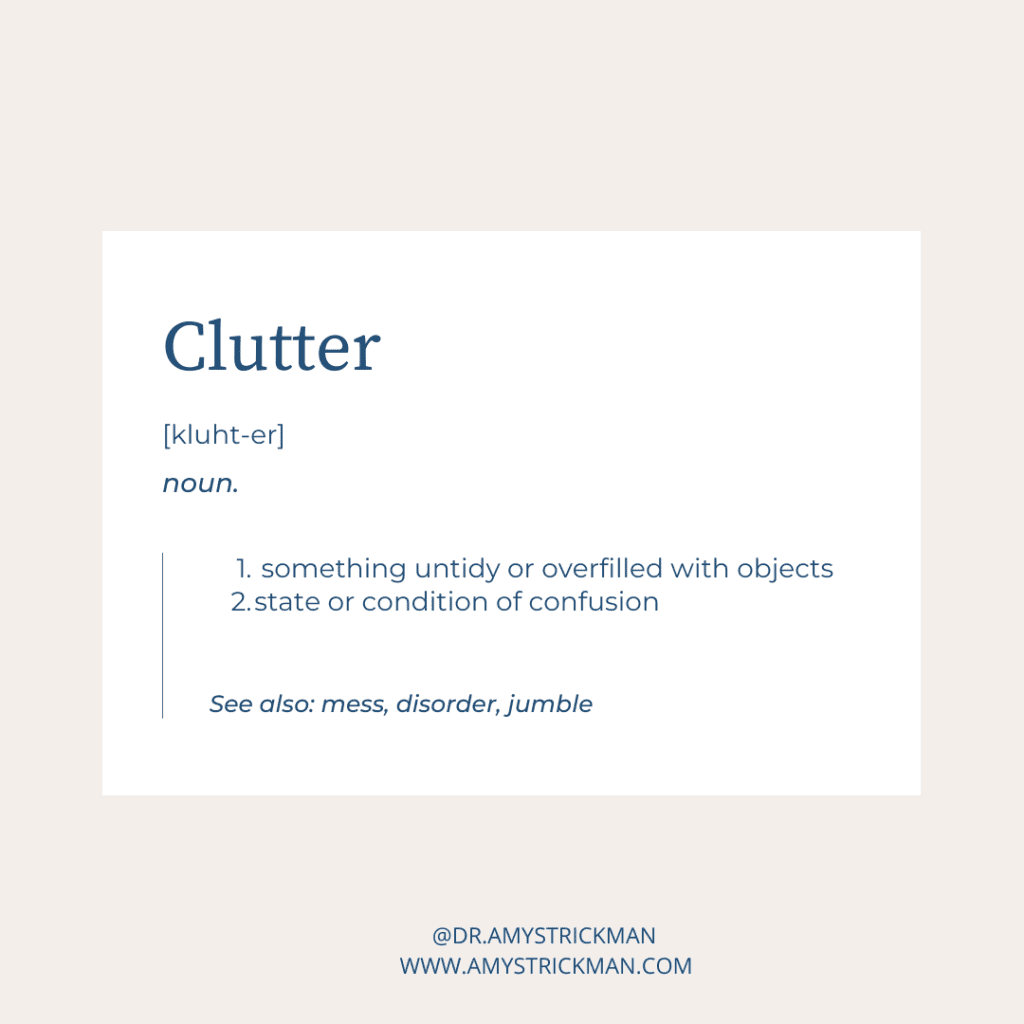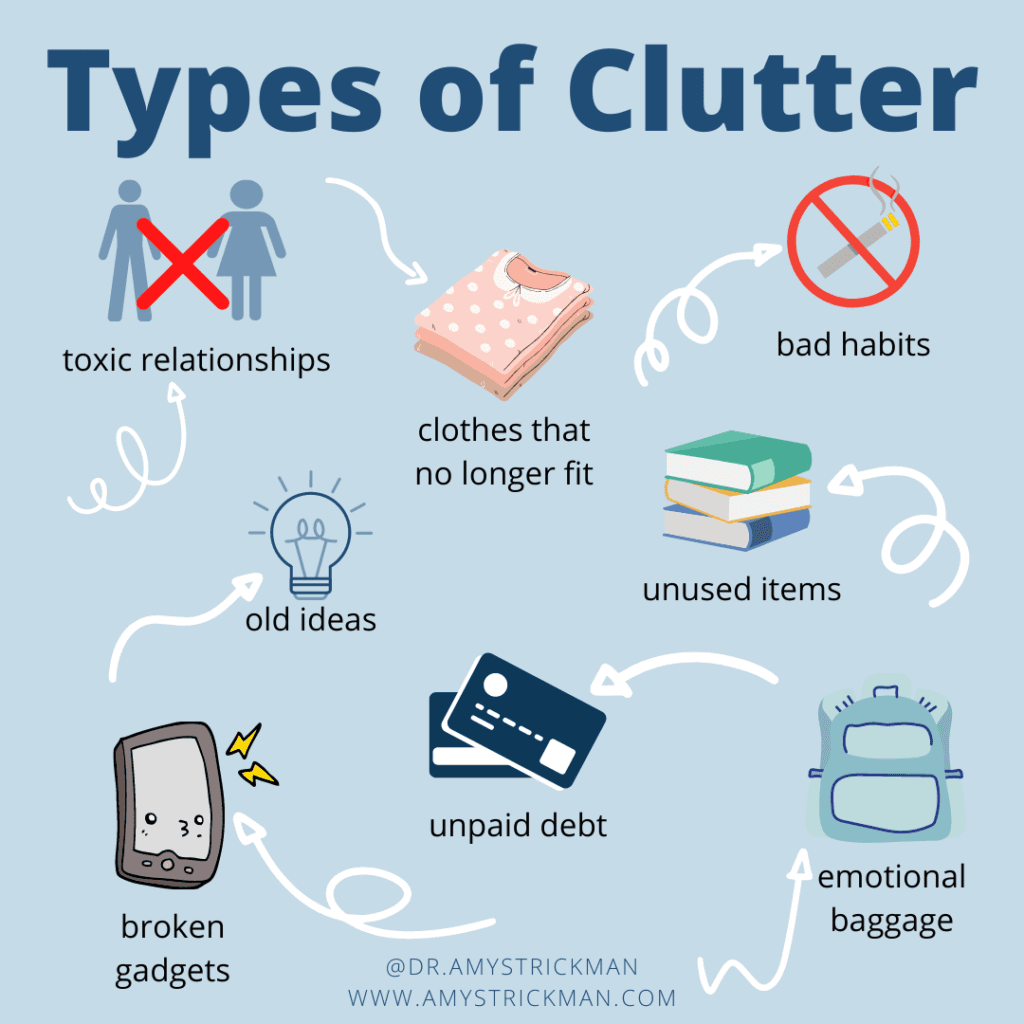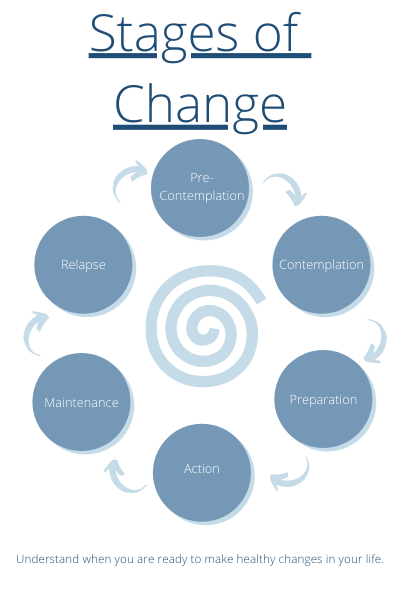How to Reduce Clutter and Live More Stress Free

How much clutter do you have at home? Or maybe its your office desk or car that is cluttered? Clutter is defined as something untidy or overfilled with objects. Other words to describe clutter are MESS, DISORDER, or JUMBLE. If you notice yourself struggling to find a paper amongst all the piles or having to dig through items to find what you are looking for, then you may have a clutter problem.

What is Clutter?
There are many different types of clutter we experience in our lives. We have physical clutter such as clothes that no longer fit, broken gadgets, or unused items. Maybe you have a closet or a room full of stuff that you never use? You can have clutter at home, your car, office, or other places you spend time.
We can also have clutter in other aspects of our lives. Toxic relationships, old ideas, unpaid debt, bad habits, and emotional baggage can also be classified as clutter. Today, we are going to focus on physical clutter in our surrounding environments– how it impacts us emotionally and how to fix the problem.

Why is Clutter Bad?
Clutter leads to an increase in stress making it more difficult to relax both physically and mentally. A 2009 study found that mothers whose home environments were cluttered experienced significantly higher cortisol, a stress hormone, and higher levels of depression (Saxbe & Repetti, 2009).
The problem is that having clutter in our environment sends a signal to our brain that there is work to be done. We are unable to fully relax when there is a pile of clutter in our vicinity. Clutter creates additional stimuli in our environment which then draws our attention away from what we are attempting to focus on in the environment.
Clutter can be frustrating as it oftentimes prevents us from easily finding certain items in a quick manner. Can you find those tax documents from last year? Or that spare key you last saw a month ago? How about that document at work you know is buried in one pile or another?
Finally, clutter can inhibit our growth. We are less productive and struggle more with creativity when in a cluttered environment. It is also more difficult to think clear-headed or problem solve when there is more clutter in our environment.
5 Ways to Reduce Clutter
We want to feel comfortable in our personal space (i.e., home, office, or car). Having a tidy, clutter-free space can help create a more comfortable environment while decreasing stress and improving overall wellness and productivity.
Take a few moments to think through the clutter in your space. How is clutter weighing you down? Are those items adding value to your life? What caused you to hold on to those items after all these years? Is it worth the additional stress?
Once you decide to declutter your space, follow these steps to be most successful:
1. Start with one space at a time.
It can be very overwhelming to tackle decluttering or cleaning the entire space at one time. Let’s not focus on the entire space (i.e., the entire house). Instead, start with one room, a small space, or even one cabinet. Having a small win can give a little confidence to then tackle the next space.
2. Throw away anything not of value
Throw away anything that is not of value. This can include old papers, expired items, crusty cleaning bottles, old makeup, and broken toys or gadgets. Throwing out these items at the start to the decluttering process is a quick, easy task that will then allow you to focus on harder decluttering tasks later.
3. Donate items of value that you no longer need
We oftentimes have items that we do not use, but could be valuable to someone else. These are great items to donate. This can include clothes that no longer fit, gently used furniture, or minimally worn shoes. Donating these items allows someone else to be able to benefit from them. One idea is to have a donation box set aside in a low traffic area of your house. As you come across items that you would like to donate, add it to the box. Once the box is filled, or at a specified period (i.e., end of each month), take the box to the donation center and then start a new box at home.
4. When buying a new item, get rid of an old item
Let’s talk about prevention for a moment. Clutter tends to pile up and before we know it, we can’t even get the door to the closet open without stuff falling everywhere! A good rule to prevent clutter from pilling up is the 1-for-1 rule. Every time you buy a new item, get rid of an old (usually similar) item. For example, when you buy a new pair of shoes, then get rid of an old pair of shoes. This can work with children’s toys, clothes, kitchen utensils, books, etc.
5. Do a light cleaning everyday
Dedicate 10 minutes of every day to tidying or cleaning up your home, car, or office a little. Spending a brief period each day will help prevent clutter from pilling up. There are many good times to accomplish this task at home such as in the morning before work, right when you get home from work and unwinding, while dinner is cooking, or right before you go to bed at night. For the car, set a rule to always throw away your trash when getting out. Get in the habit by cleaning at the same time every day.
Challenge
Take a few minutes to think about all the items in your environment. Are there certain clutter areas in your home, office, or car that bother you? How can you tackle that problem area this week? I challenge you to pick an area of your space and work through these 5 steps. If this is overwhelming, start with only one step in this process.
I know it can be difficult to work up the motivation to declutter your space, however, know that this will help decrease stress in the long-term.
Enjoy this article? Check out some other important articles:
5 Steps to Problem Solving any Conflict
Stress Management: How to Cope with Stress



Excellent website. A lot of helpful info here. I’m sending it to a few friends ans
additionally sharing in delicious. And obviously, thank you
to your sweat!
Thank you, take care!
Hey! Would you mind if I share your blog with my twitter group?
There’s a lot of people that I think would really enjoy your content.
Please let me know. Cheers
You are more than welcome to! Take care, Amy